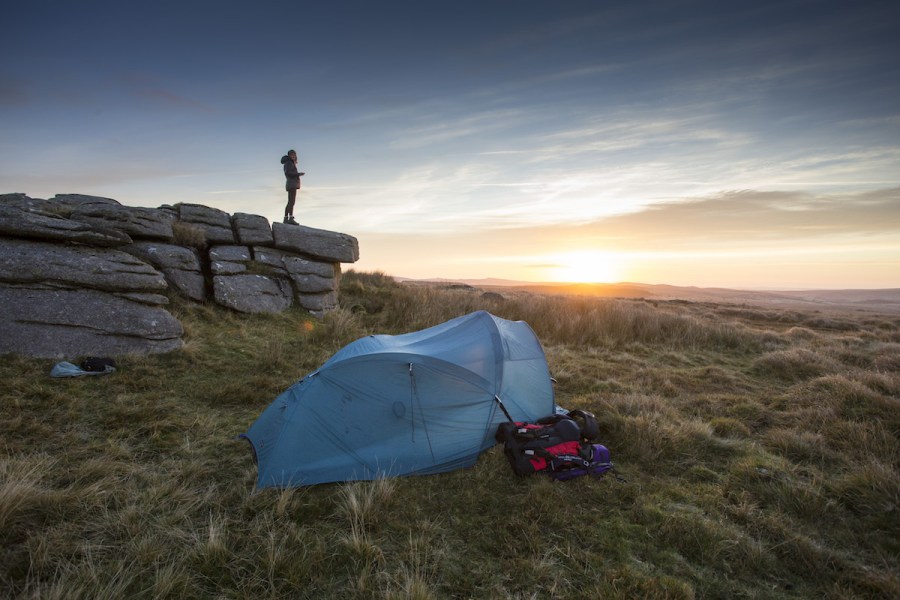Lockdown is easing in England and Scotland over the next few days, but is wild camping back on the cards? Here’s what we know so far…
What’s the wild camping situation in England?
In England, overnight stays in ‘self-contained accommodation’ are permitted from tomorrow (4th July) – meaning that wild camping is potentially an option, provided campers remain within their own ‘bubble’. It should, of course, be noted that wild camping is not officially legal in most places in England (although it is legal on Dartmoor and traditionally tolerated in the Lake District as long as it is done discreetly and responsibly). We’d suggest factoring the additional pressure on English beauty spots and current antagonism towards ‘wild campers’ (see below) into your decisions.
What do the 4 July lockdown changes mean for climbers and hill walkers? With further easing of lockdown in England taking place from 4 July, the BMC access team takes a look at how this will affect BMC members. https://t.co/WzxwEh8uab pic.twitter.com/XPWeAsFuH3
— British Mountaineering Council (@Team_BMC) June 25, 2020
The BMC says: “The proposed changes will allow overnight stays and staycations from the 4 July meaning holidays and weekend trips will be possible within England once again. In addition, two different household groups can meet anywhere – inside or outside – providing they maintain social distancing, but it does not allow larger groups to stay together where members of more than two households are involved.”
How about Wales and Scotland?
Wales will lift travel restrictions on 6th July, but travel will be permitted into Wales from England only for day trips. “Wild camping and van camping are still not permitted under the regulations and the police have stated that anyone seen van camping, staying in motorhomes or wild camping will be moved on and potentially fined,” says the BMC. It is expected that self-contained holiday accommodation will re-open from 11th July, but wild camping will still not be permitted.
Great news today: all going well July 3 is the big day for a return to the hills. Let's all remember to be responsible out there and have many happy returns!https://t.co/QMlWKwMvoH pic.twitter.com/oHAIEXniyV
— Mountaineering Scotland (@Mountain_Scot) June 24, 2020
In Scotland, travel restrictions were relaxed today (3rd July). However, wild camping is still not allowed. Mountaineering Scotland said: “Mountaineering Scotland has welcomed the lifting of the five-mile travel limit for recreation, which will mean the majority of regular hill walkers and climbers will be able to return to the Scottish hills for the first time since lockdown started…However to help manage visitor numbers over the next couple of weeks the Scottish Government is asking those who want to camp in tents in the wild to wait until the 15th of July.”
Are bothies open?
No. The latest news from the Mountain Bothies Association (MBA) is that all bothies maintained by the MBA are currently closed. However, a spokesperson for the MBA said on 30th June said that it expected to “be in a position shortly to make a decision about a return to their responsible use in line with Government guidance.” Keep an eye on https://www.mountainbothies.org.uk for further updates.
Bothies used by hillwalkers and climbers are to remain closed until further notice https://t.co/MiOZbF2ZkG
— BBC Scotland News (@BBCScotlandNews) July 1, 2020
Anything else to bear in mind?
You might have noticed that ‘wild camping’ is getting something of a bad press at the moment.
https://twitter.com/townsendoutdoor/status/1276665010123608067
“Pictures of dumped tents and camping gear surrounded by trash are all over social media,” says Chris Townsend in a recent blog post. “This, we are told, is wild camping. It isn’t. Mostly it’s roadside camping, never far from a car. Sometimes camping gear is lugged a bit further before being dumped – there is the strange find of a wheeled suitcase, abandoned tent, and other stuff high up at Angle Tarn in the Lake District – but generally it’s people wanting a party rather than an outdoor experience who leave this stuff.”
It remains to be seen whether recent events will prejudice the public and the authorities against wild campers, but it pays to be cautious. Particularly in England (and Wales when permitted) we’d advise taking extra care to choose camping spots that are high and remote and, of course, wherever you’re camping, leaving the site as you found it.







